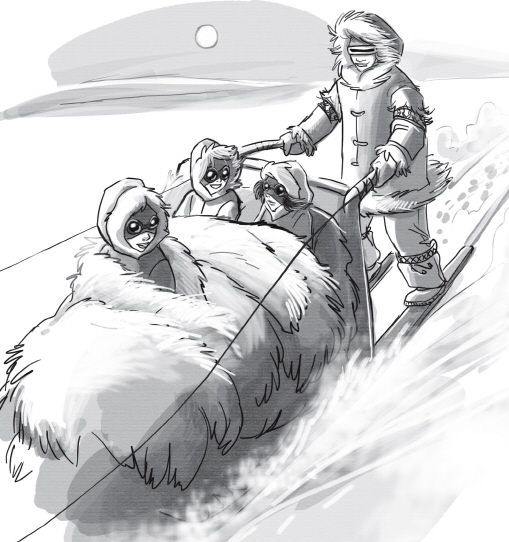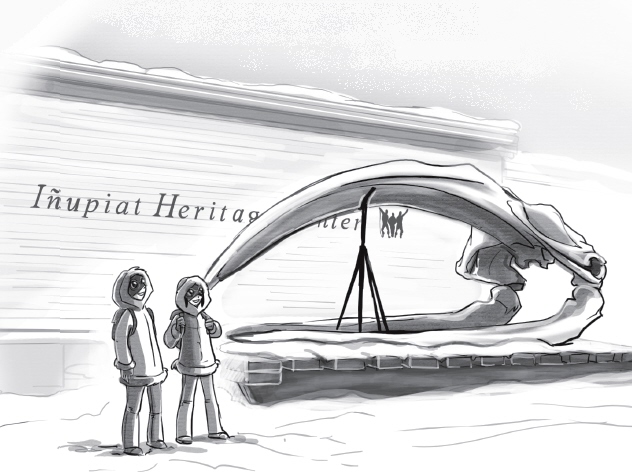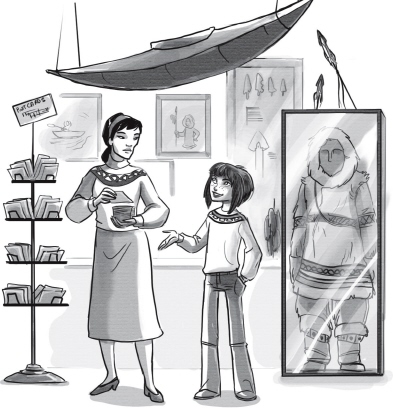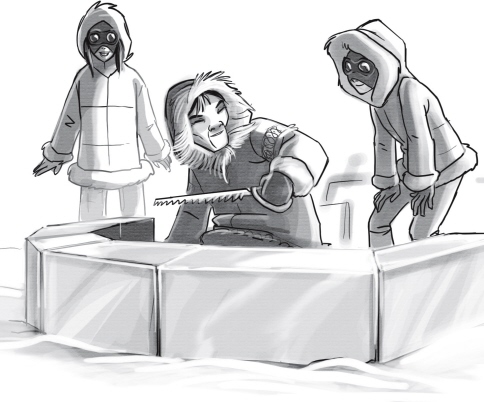Polar Meltdown (3 page)

The landscape was very flat and the snow lay deep and undisturbed. One solitary bare tree was growing on a small mound.
In spite of his warm clothes, Ben gave a shiver. This was like nothing he'd experienced before. The coldest place he and Zoe had ever been was Austria on a family skiing holiday. And then they'd been able to go back to a cosy hotel when they got cold. Who knew what lay ahead of them on this mission? No roaring fires for certain once they'd embarked on their search.

“Do you go everywhere on dog sledges?” Zoe asked the driver.
Charlie grinned at her. “Only when I'm transporting tourists,” he said. “We know you like to see the old way of life of the Inupiat people â which is why I dress in the traditional way. We have motorised sledges for everyday.”
“Cool!” exclaimed Ben. “But what do the dogs do then?”
“There are enough tourists to keep them busy,” chuckled Charlie. As the sledge took a bend, a vast sparkling expanse of ice came into view, broken by small channels of dark water. “The Arctic Ocean,” their driver announced.
The sledge joined a wider road and eventually they came to a short main street of shops and a couple of restaurants. Other roads branched away, lined with single storey houses painted in bright colours.
At the far end of the street the driver urged the dogs through a gateway. They stopped outside a large, grey brick building with a gently sloping snow-covered roof. It stood right on the shore of the ocean. A row of flags flapped in the freezing wind. Among them Ben recognised the deep blue of the Alaskan flag with its rich yellow stars.
“That's the North Star,” he said, pointing at the largest star, “and the Plough constellation â also known as the Great Bear.”
“OK, show off!” Zoe laughed. “But the Great Bear's just right for our mission,” she added in a whisper.
They jumped out of the sledge and Erika paid Charlie. The children gazed in awe at a huge skull displayed on a plinth outside.
“Look at that!” gasped Ben. “It's as big as a car!”
“That's from a bowhead whale,” explained Charlie. “You'll find out all about the history of whaling inside.”
Although she tried to hide it, Ben caught a glimpse of Zoe's disapproving expression.

“I bet that was hunted,” she said under her breath.
“We have to accept it's a different way of life,” he muttered to her. “The Inupiat rely on whale hunting for food and income.”
“I know,” Zoe replied, “but it just seems so cruel.”
Ben turned back to Charlie. “We were hoping to talk to the fisherman who got attacked by a polar bear,” he said. “Do you know where we can find him?”
“Lukie's getting famous!” said the driver. “You might find him inside. He works here when he's not out fishing. He looks after our whaling display.”
They thanked him and pushed open the swing doors to the centre. The welcome warm air hit them straight away. They left coats, balaclavas and backpacks in the cloakroom and took in their surroundings.
The centre was a huge, open-plan building with cabinets full of Inupiat traditional dress and cooking utensils. Beautifully crafted harpoons and kayaks were suspended on wires from the ceiling, and photographs of whaling expeditions past and present stretched along one wall.
Ben made straight for the café in the corner and began to eye up the menu.
“You can't be hungry,” said his sister. “You finished off all the sandwiches
and
had a whole pizza on the plane.
“That was ages ago!” protested Ben. “I'm starving.”
“We have to find the fisherman first,” insisted Zoe.
A woman was stacking postcards into slots on a stand. Zoe went up to her.
“Excuse me,” she said. “We heard about a man who got attacked by a bear. We'd like to hear his story. Is he in today?”
The woman put down the postcards. “You mean Lukie,” she said. “That young man's always taking risks. Now everyone's talking about his narrow escape. I haven't seen him this morning.”
“What about Theo Airut?” asked Zoe. “It was his blog that told us all about the attack. Perhaps we could speak to him instead.”
The woman looked surprised at Zoe's persistence.

“We're doing a school project on polar bears,” Ben explained quickly.
“That's why you're so keen,” said the woman. “There are plenty of people here who've seen polar bears, but most of us keep our distance!” She nodded to Erika. “It's nice to see kids so keen on schoolwork. You must be proud of them.”
“I am,” said Erika. “They never let me down.”
“Aw, Mum,” protested Ben. “You're so embarrassing.”
“Do you know where Lukie was when the attack happened?” Zoe asked the woman.
“We want to draw a map for our project and mark the exact spot,” added Ben. “It'll make it more exciting to read.”
“I wish I could help,” said the woman, “but I don't think he said.”
“Would Mr Airut know?” asked Zoe.
“He's not here,” said the saleswoman. “He's gone to Anchorage for a few days for a conference.” She smiled. “We're a small community â we all know each other's business.” She saw the children's disappointed faces. “Are you sticking around?” They nodded. “Lukie should be in later.”
“What do we do now?” asked Ben when they'd thanked her and walked out of earshot.
“Time to eat,” said Erika.
Ben rubbed his hands together eagerly at the thought of dinner.
“I'm going to find somewhere quiet to contact Dr Fisher for an update on the oil drilling project,” Erika added in a low voice. “Will you be all right on your own, children?” she said out loud, as the saleswoman walked by.
“Of course we will, Mum!” declared Ben, pretending to be offended at the question.
“Try and behave yourselves,” said Erika, as she headed off for the cloakroom.
After a plate of fried herring and a giant chocolate chip muffin, the children walked round the displays of whaling memorabilia. They pretended to be deeply engrossed in the exhibits, but glanced around eagerly every time someone came into the centre. Not one of them looked like a local young man.
“Time's running out,” said Zoe anxiously. “Those babies are not going to survive long without their mother.”
“We're not giving up,” said Ben. “See that sign by the door. There's traditional igloo and boat building going on outside. Someone else might know Lukie's story and have the information we want.”
They pulled on their coats, gloves and balaclavas, then pushed open the swing door and stepped into the bitter air. A freezing wind blew round them making the flags flap violently. They could hear the ice cracking against the shore as the grey waves washed it in.
“Look at this,” gasped Zoe, staring at a display board that showed maps of the Arctic and the changes that had occurred over the years. “Thirty years ago there was about three times as much old ice as there is now.”
“What's old ice?” asked Ben.
“Old ice is the permanent Arctic ice cap,” said Zoe. “And according to this it's getting smaller very quickly.” She read aloud: “âEach year it's replaced with newer, thinner ice that melts more easily in the summer.'”
“That's not good news for the polar bears,” said Ben. “There'll be even fewer seals to eat.”
They walked on through an arch made of whale rib bones. Ben strode ahead along a cleared path to a circle of snow bricks. An old man in traditional dress was squatting by it, cutting more bricks with a long knife. His thick black hair, threaded with white, stuck out from under his hood. He looked up and nodded as the children approached.
“Cool!” exclaimed Ben. “I didn't realise people made igloos any more.”
The old man shook his head. “Not many of us learn how to do it these days,” he said.

The children could hear the American in his voice, but they could tell from his accent that English was not his first language. “Eskimos like me used to build igloos when they travelled many miles over the ice to hunt.”
“Eskimos?” exclaimed Zoe. “But I thought we weren't supposed to call you that.”
The old man's lined face broke into a grin. “You've heard it's an insult to our people. It is not used in Canada, but here in Alaska we are proud to call ourselves Inupiat Eskimos. Though of course you can call me by my name, Amaguq.”
“How long does it take to build an igloo?” asked Ben eagerly. “I've always wanted to have a go.”
“We haven't got time to chat,” Zoe muttered to Ben. But Amaguq was obviously pleased to talk to visitors about his craft.
“For a skilled worker like me, a few hours,” said the man. While he talked he cut a new block and trimmed it with an expert hand so that it fitted neatly on the igloo wall. It was just like watching a bricklayer at home, thought Ben.
“An igloo made a perfect shelter for hunters who were away for weeks on the ice,” said the man. He put his knife down. “Of course, if they needed shelter in a hurry they'd dig a snow hole in a bank. Much quicker.”